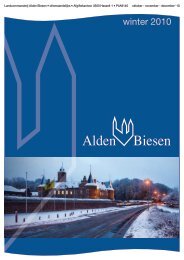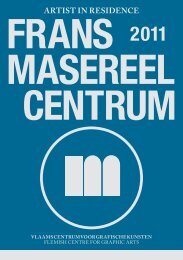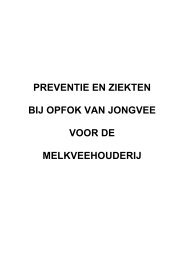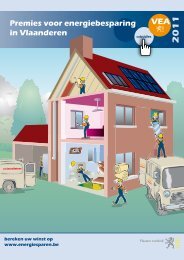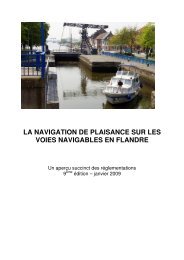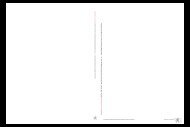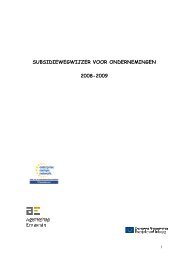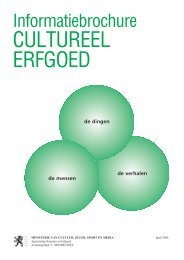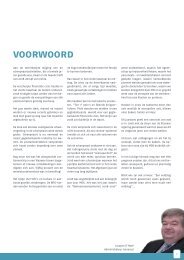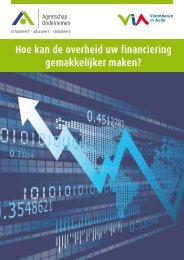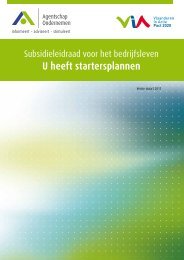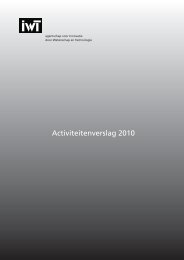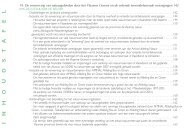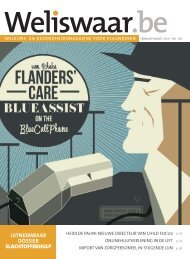Acknowledgements Book of abstracts - Publicaties - Vlaanderen.be
Acknowledgements Book of abstracts - Publicaties - Vlaanderen.be
Acknowledgements Book of abstracts - Publicaties - Vlaanderen.be
You also want an ePaper? Increase the reach of your titles
YUMPU automatically turns print PDFs into web optimized ePapers that Google loves.
Wiebke Wellbrock presents Poster 82 during the poster sessions in the Aula.<br />
Session theme 6: Free topics<br />
154<br />
Poster 82<br />
PIG WELFARE IN CROATIA: A CRITICAL REFLECTION ON THE EU<br />
WELFARE DIRECTIVES<br />
W. Wellbrock 1 , S.J. Oosting 1 , B.B. Bock 2<br />
1<br />
Animal Production Systems Group, Department <strong>of</strong> Animal Sciences, Wageningen University, Wageningen,<br />
The Netherlands<br />
2<br />
Rural Sociology Group, Department <strong>of</strong> Social Sciences, Wageningen University, Wageningen, The<br />
Netherlands<br />
Binding EU directives aim to ensure a basic and uniform standard <strong>of</strong> pig welfare throughout the<br />
European Union. Also EU candidate countries must comply with European welfare standards. The<br />
EU directives are designed to ensure pig welfare in intensive housing systems but in candidate<br />
countries, such as Croatia, non-intensive, smallholder farms <strong>of</strong>ten prevail. Croatia does not yet<br />
comply with EU welfare standards. The aim <strong>of</strong> this study was to investigate how and why pig<br />
welfare in Croatia does not conform to EU welfare directives.<br />
In this explorative study, seven smallholdings (< 10 pigs), five middle sized farms (10-99 pigs) and<br />
four large farms (≥100 pigs) were purposively selected throughout Croatia to investigate pig<br />
welfare by using direct and indirect measures <strong>of</strong> farm animal welfare. Direct assessment tools<br />
included e.g. lesion, cleanliness and fear scores and indirect measures included e.g. pen size,<br />
flooring and ventilation scores. Results were analysed using non-parametric tests for correlation and<br />
independence. To understand the present welfare conditions, semi-structured interviews with 17<br />
farmers and eight representatives <strong>of</strong> public authorities gave insight into pig welfare perceptions<br />
while legislative differences <strong>be</strong>tween Croatia and the EU were addressed with a literature study.<br />
Results <strong>of</strong> the welfare assessment question whether divergences <strong>of</strong> EU directives at small and<br />
middle sized farms are an indication <strong>of</strong> lower animal welfare. For instance, cleanliness <strong>of</strong> the pigs<br />
increased and frequencies <strong>of</strong> lesions decreased with decreasing farm size. Also, provision <strong>of</strong><br />
<strong>be</strong>dding increased with decreasing farm size and was positively correlated with cleanliness and<br />
negatively correlated with lesion frequency.<br />
EU welfare directives and scientific assessment tools may not <strong>be</strong> suitable to account for a general<br />
assessment <strong>of</strong> pig welfare in EU candidate countries. Different approaches to animal welfare<br />
assessment may <strong>be</strong> necessary to ensure a basic standard <strong>of</strong> animal welfare in Croatia and other<br />
(European) countries with predominantly smallholder farming systems.<br />
Contact information: Wiebke Wellbrock or email wiebke.wellbrock@wur.nl<br />
Complete address: Department <strong>of</strong> Animal Sciences, Animal Production Systems Group, Wageningen<br />
University, Marijkeweg 40, 6709 PG Wageningen, The Netherlands<br />
Species: Pig



